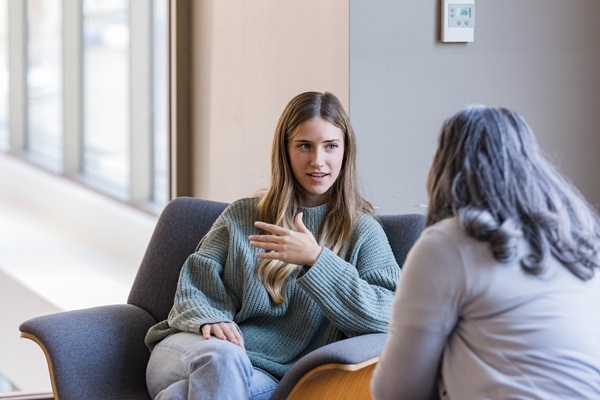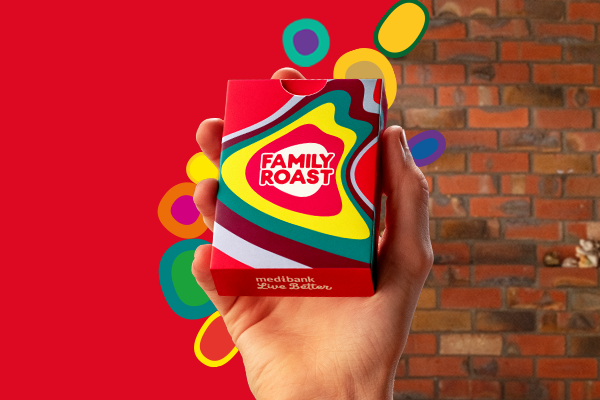How to manage hard conversations about mental health

How are you?
We say it all the time. It slips out in passing, at the start of meetings, when we open the door and greet close friends or family. But often, we ask without really wanting the answer. What if, one day, someone told you how they really feel? What if they said, “Not good,” or “Actually, I’m struggling”? Knowing what to say next – how to respond with care, not just habit – is something many of us aren’t prepared for. And yet, in a world where so many people are quietly holding on to more than they let on, learning how to truly listen and speak with empathy isn’t just helpful, it’s one of the most powerful ways we can be there for each other.
If someone opens up to me, what should I do if I don’t know what to say or how to respond?
When someone opens up about their mental health, it’s natural to worry about saying the wrong thing or not knowing what to say at all. But according to Medibank psychologist Alison Sutton, there are no perfect words or scripts to rehearse. Instead, she emphasizes that presence matters more than perfection. "Just know that you don’t have to be perfect or have all the answers," she says. "The key is to keep it honest, real and authentic," she adds. "There’s a lot to be said about that human element."
Tips on what helps and what might not
1. Validate what they’re feeling, don’t minimise it.
It might come from a good place, but certain phrases like the below can unintentionally shut someone down.
- “Don’t worry, other people have it worse.”
- “It’s not that bad.”
- “Just think positive.”
Instead, Sutton suggests small, supportive acknowledgments like the below to create a space where someone feels heard and understood.
- “That sounds really hard.”
- “I am so glad you told me.”
- “I can see this is tough for you."
2. Lead with empathy, not judgement.
This can be challenging – especially if you’re in a role like a parent hearing something confronting from a teenager. But no matter what comes up in conversation – even if it’s hard to hear – try to listen and accept their experience and emotions without blaming or getting angry, suggests Sutton. Listening without judgement helps keep the conversation open, judgement can quickly shut it down.
3. Listen to understand, don’t jump to fixing.
Your instinct might be to jump in and solve the problem, but often the most supportive thing you can do is simply be there. "Don’t jump to problem-solving," Sutton advises. "Try to listen, and listen to understand, rather than listening to respond or to give advice." Most people aren’t looking for advice, they’re looking to feel heard.
4. Give them space to tell their story, don’t shift the focus too soon.
It’s natural to relate by sharing your own experience, especially if you’ve been through something similar. But early in the conversation, Sutton recommends holding back. "Say your friend is going through a divorce and you’ve been through one too – you might want to share advice and tips to help," she says. "But try not to talk about your own experience straight away. Let them speak and share theirs first."
It's not always what you say, but what you do
Sometimes, the most powerful response doesn’t come in the form of words at all. Just sitting beside someone, staying quiet, and showing through your body language that you’re fully present can be comforting. Sutton says non-verbal cues – like eye contact, an open posture or a gentle nod can signal empathy and safety, without saying much at all. "Being the best listener isn’t about having the perfect response", explains Sutton. "It’s about creating a space where someone feels you’re just sitting there with them, and you want to hear what they have to say, and that’s all you’re there for." Silence might feel awkward, but when someone is struggling, your calm, steady presence can speak louder than any perfectly chosen phrase ever could.
How can I support someone to open up about their mental health?
A simple “How are you going?” or “You don’t quite seem yourself — are you OK?” can be a good way to begin. Sutton recommends bringing it up in relaxed moments, when you're both doing something familiar or enjoyable — like after a yoga class, during a drive, or over dinner, as this can help ease the pressure and make the conversation feel more natural.
How can I talk to someone I’m worried about?
Dr Chris Robinson, Medibank's Chief Medical Officer explains the importance of creating a safe space for meaningful conversations with the people you care about.
Click the video to watch
How can I support someone if they’re not ready to talk?
Despite your best intentions, someone might not want to open up. And that’s okay. Instead, let them know you’re available and there for them. Sutton emphasises the importance of respecting boundaries and showing up in small ways that are meaningful to your relationship. "It could just be sitting with them from time to time, going for a coffee or doing those things that you both enjoy, especially if you’ve seen them drop those activities". Gentle reassurances that show you’re there for someone, may leave the door open for future conversations.
A conversation worth having
So, next time you say “how are you?”, mean it. Be ready to hear the real answer. It might feel like a small gesture, but that everyday question can be the start of something much bigger. As Alison Sutton reminds us, supporting someone doesn’t require the perfect words. It just takes presence, patience and a willingness to truly listen. In a world where so many people may be quietly waiting for someone to ask – and really mean it – that simple check-in might just matter more than you think.
How to seek mental health support
If you are experiencing mental health struggles, a good place to start the discussion about getting help is with your GP.
Medibank's 24/7 Medibank Mental Health Support is also available for all Medibank health insurance members. Talk with a mental health professional over the phone or online about any mental health or emotional concern and get guidance on what you can do next. Chat online or call 1800 644 325 any time of the day or night, 7 days a week at no extra cost.~
If you, or someone you know, needs immediate support or medical assistance, contact 000 in an emergency or Lifeline on 13 11 14.

Get together and have a tasty conversation.
The Medibank Family Roast is a card game designed to get families connecting and talking. Because when the bonds of family are stronger, Australia is stronger. So get around the dinner table, it’s time to serve the questions you’ve always wanted to know the answer to.
How can we help?
I want to know how my cover supports mental health
I need help and want to talk
Related articles
Things you should know
~ Some referred services may involve out of pocket costs and waiting periods may apply.
While we hope you find this information helpful, please note that it is general in nature. It is not health advice, and is not tailored to meet your individual health needs. You should always consult a trusted health professional before making decisions about your health care. While we have prepared the information carefully, we can’t guarantee that it is accurate, complete or up-to-date. And while we may mention goods or services provided by others, we aren’t specifically endorsing them and can’t accept responsibility for them. For these reasons we are unable to accept responsibility for any loss that may be sustained from acting on this information (subject to applicable consumer guarantees).


